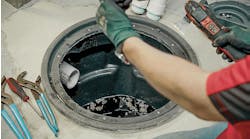Robert Bean, www.healthyheating.com, recently wrote about the claim that equipment conserving energy is promoted by saying it saves energy: "Since we can't create energy nor can we destroy it (are you sitting down?) — we can't save it. That's right — despite the message by just about every non-scientist about how to 'save energy' — energy cannot be saved."
If Robert was wrong, we'd have energy savings accounts in banks where we could withdraw as needed to supplement our heating and cooling energy-use!
Here's another thought: If we can't literally save energy, can we stake a claim that energy conserving equipment saves money?
OK then, what can we, as contractors, say that's factually correct and grabs our customers' attention while conveying the message that our higher-efficiency mechanical systems are in their best interest for "saving" energy and money? I went digging for gold and found it — read on.
Consumers became keenly aware of saving money and energy over the past few years when fat tax credits made selling high-efficiency equipment a virtual no-brainer. The upgrade was actually cheaper after they received the tax credit! Visit www.dsireusa.org for tax credits, incentives, and utility rebate information. With the consumer awareness focused more on the now-expired tax credit than the energy conservation, we now need something short, sweet, and to the point that is as good as, or better than, the deceased tax credit. I found something that works.
Energy prices are rising rapidly. That's creating a hardship for consumers and they're more receptive to the idea of saving energy and money. The problem is, they aren't stupid and while we're standing in front of them telling them their new furnace, boilers, water heater, etc., will save them energy and money, they know that's not really an accurate statement. They know it will reduce their energy bill, but it will be up to them to somehow figure out what their new payroll-deduction should be every week and religiously set that aside in order to save money. That's not gonna happen. Which means what? Your credibility is somewhat lower, the sale just got tougher to close, and no one in the room really knows why because the thought process was an underlying subtle current, flowing through your customers' minds.
Do you want to sell high-efficiency equipment like hot cakes at a pancake jamboree? If so, then you're an energy conservationist and you need to stand out from the crowd during your sales pitch. There is a real value to what it is you are offering and the term Energy Conservation Value (ECV) fits it like a glove.
ECV in simplest terms is the amount of energy conserved at today's current charge-rate from the utilities when compared to either their existing appliance or, better yet, between the new appliances. Chances are your competition will be offering lower-efficiency equipment that carries a lower price tag. Why not offer both or, better yet, good, better or best options. Your competition can be left in the dust if you take your sales presentation past the here's-my-price-only and you should hire us because we're the best.
If the customers are contemplating a new appliance, they want to know why spending $2,500 more for the high-efficiency boiler makes good cents. If all you're doing is showing them the installed costs and stated/rated efficiencies, there's no real sizzle. There's a lot they can do with that $2,500 and let's face the ugly truth — boilers (or any other HVAC appliance) don't have much sex appeal. ECV does, and it dovetails nicely with ROI.
Break out of the commodity mold. If all you're doing is dropping the price-bomb with customers, you will be nothing more than a price-driven commodity in their eyes. If you’re not the cheapest bidder, chances are you aren't getting that sale. Use ECV and ROI and you can walk away with the contract and be the highest bidder, but only if the customers understand your installation and products offer the best ECV and ROI.
For the boiler comparison (82% chimney-vented atmospheric vs. 95% modcon) I used recently, the first year's ECV was $1,000.
Show me the money honey! For the closer to seal the deal, pick a time span you feel comfortable using in years. If you believe the product can last 20 years with the maintenance contract you will be promoting, then go with that and add 5% per year to the ECV because fuel costs will rise. The 'accumulated ECV' column on my spread sheet illustrates that simple payback (without actually using that dreaded sales-killing term) occurs in the third year, but also rivets their attention on the accumulated ECV total of $28,132.38 they get to keep instead of giving that to the utility companies.
Take off the up-front cost blinders. Not only does that dreaded up-front increase in the installation cost of $2,500 suddenly look tiny, the total installed cost sticker-shock-blinders go away and now everyone in the room can see the value you present. Now is the moment to ask them to sign your contract.
Dave Yates owns F.W. Behler, a contracting company in York, Pa. He can be reached by phone at 717/843-4920 or by e-mail at: [email protected].
All Dave Yates material in print and on Contractor's Web site is protected by Copyright 2011. Any reuse of this material (print or electronic) must first have the expressed written permission of Dave Yates and Contractor magazine. Please contact via email at: [email protected].

